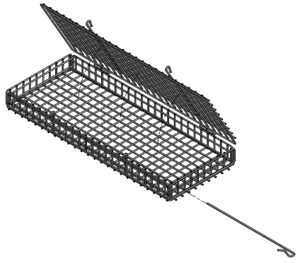 When most people think about deep-frying baskets, they picture something small scale, like for a deep fryer that sits on the counter at home. Some people might think of the big deep-frying baskets that fast food restaurants use for fries. However, there’s a scale of deep fryer that goes beyond what most people see. These industrial-scale deep fryers are meant to process several tons of food each day in massive batches that would be impractical in anything but a full-scale manufacturing plant.
When most people think about deep-frying baskets, they picture something small scale, like for a deep fryer that sits on the counter at home. Some people might think of the big deep-frying baskets that fast food restaurants use for fries. However, there’s a scale of deep fryer that goes beyond what most people see. These industrial-scale deep fryers are meant to process several tons of food each day in massive batches that would be impractical in anything but a full-scale manufacturing plant.
Recently, a major food manufacturer reached out to Marlin Steel for a custom stainless steel basket for their commercial-scale turkey processing needs. They needed a basket that would:
- Securely hold a large number of turkey legs all at once;
- Withstand continuous submersion in boiling oil;
- Be easy to clean and sanitize to prevent foodborne illness; and
- Make it simple to add or remove turkey legs.
The company cooking the cooked turkey legs was especially concerned about making certain that the legs wouldn’t fall out of the basket and maximizing the throughput of their manufacturing process. It was especially challenging to increase throughput because the turkey legs couldn’t be allowed to stack on top of one another—doing so could compromise the cooking process’ thoroughness or even cause the turkey legs to stick together.
Designing a Commercial-Scale Fry Basket
The client’s deep fryer was a massive industrial model made for processing large batches of food simultaneously. This would allow for incredibly large baskets to be fitted into the fryer with ease. However, the baskets couldn’t be too deep—otherwise, the legs would be stacked or even roll around in the basket when it would be dropped into the oil.
To maximize the basket’s turkey leg capacity while minimize the risk of leg contact, Marlin’s designers settled on making the basket especially wide but shallow. The interior of the basket would be 24” wide, but only 2” deep—just tall enough to accommodate a turkey leg and hold it snugly so it wouldn’t be likely to roll in the basket.
A hinged lid was added to keep the legs securely in the basket. To keep the lid secure, a pin was added that could be slid into or out of the lid. This way, even rough motion wouldn’t cause the lid to pop open.
Grade 304 stainless steel was determined to be an appropriate basket material for the client’s process. This metal wouldn’t be overly affected by either the fluids from the raw turkey meat or the oil the client would use in their industrial deep fryer. To ensure the turkey legs wouldn’t stick to the basket (and to help with cleaning/sanitation), the steel would be electropolished to create a microscopically-smooth surface. This, in turn, helped make the legs easier to remove once the deep frying process was finished.
Once the design was complete, it was tested using a Finite Element Analysis (FEA) software to verify that it could withstand years of use. Where normal physical prototype testing would actually require months of delay for basic usability testing, virtual physics simulations could replicate a decade of near-constant use in minutes, establishing how well the basket will last.
If any issues were detected, the design of the basket would be reworked to address those issues. Then, the design would be tested again. This process of testing and retesting would be repeated until the design could pass several years of use.
Building the Perfect Custom Industrial Frying Basket
Once the design was finalized, assembly of the basket could begin. Here, Marlin’s automated wire bending robots and industrial GMAW/GTAW welding machines played a key role in ensuring consistent parts tolerances and speed of completion for each basket Marlin made.
The wire bending robots in Marlin’s manufacturing cell can rapidly extract steel wire directly from the spool and straighten it or bend it at precise angles in seconds, then cut the wire once it’s the appropriate length. It could repeat this process, without pause, for hours on end and without losing accuracy—making for a large number of precisely-manufactured parts for the client’s basket in a fraction of the time it would take for a worker doing the bending manually.
Marlin’s GMAW/GTAW welding machine is able to tackle two different types of welding procedures (gas metal arc welding and gas tungsten arc welding) to meet different situations as needed. The precision of the computer-controlled welder ensured that no welds were missed and that weld spatter was kept to a minimum. This also helped to avoid some of the common issues of welding food-grade metals, such as over-stressing the metals, that compromise the integrity of the basket.
In the end, Marlin was able to rapidly manufacture and ship the client’s custom-made baskets—helping the food manufacturer stay on schedule for their food processing so they could meet the demands of their customers.
Need a custom food-grade basket for your own manufacturing process? Contact the experts at Marlin Steel to discuss your process and to get a custom basket quote!



.gif)


